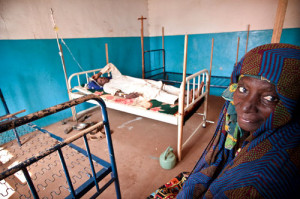Some 3.2 million people in Central African Republic lack access to essential healthcare because of the looting of medical supplies and the flight of many doctors from their posts after a coup in March that was followed by persistent widespread violence, aid agencies said.
The healthcare system has almost completely collapsed and urgent support is needed to re-build, re-staff, and re-provision health facilities across the country, a recent report from the U.N. Office for the Coordination of Humanitarian Affairs (OCHA) said.
There was a period during the change of leadership when there was no police force, no gendarmerie and no army, and it was then that most of the looting occurred, said Vincent Pouget, spokesman for the International Committee of the Red Cross.
“Solar panels have been taken, there are no mattresses left and medicines have been taken or damaged. Ambulances donated by NGOs have been gutted, with engines and wires removed so they cannot be used any more,” Pouget told Thomson Reuters Foundation.
“In one place, the light bulb of a surgery lamp was taken. The bulbs are quite cheap, but they are very specific and cannot be found in the local market. So now you have a hospital where they are doing surgery at night using candles,” he said, speaking by phone from Bangui.
Even before the coup CAR, population 5.2 million, had some of the worst health indicators in the world and fewer than 5 doctors per 100,000 people, according to the World Health Organization.
Since March, the largely uncontrolled rebel movement has inflicted death and destruction on many towns and villages, though there is at least a basic level of security in the capital Bangui.
“Doctors are appointed to their posts and have no family ties in the region. When the fighting broke out, they decided to leave [for Bangui],” Pouget said. “In Kaga Bandoro, six hours drive north of Bangui, the only doctor for the whole area returned just one month ago after a lot of persuasion. So for several months, the facilities in Kaga Bandoro were functioning only with nurses,” he said.
“Inevitably, when there are no services, people seek alternatives,” said Alain Coutand, Director of Regional Operations at Action Contre la Faim (ACF), an INGO responsible for treating malnutrition and implementing water, sanitation and hygiene programmes in CAR.
“We’ve seen examples of people displaced in the bush making their own soap with ashes and plants, so you can imagine they are referring back to traditional medicines too,” said Coutand.
NGOs withdraw
The killing of two aid workers this month in Bossangoa, three hours drive north of Bangui, has also intensified the need for security and stability so that medical aid can reach those in the countryside.
“Security is the number one priority. In March 2013 one of our bases in Bossangoa was destroyed by the Seleka rebels and the local population, so like some other NGOs, we had to pull out. The current situation is still the same,” said Coutand.
Last week, fighting broke out again in the northwest of the country, killing hundreds of civilians and forcing the new president, Michel Djotodia, to sack the army chief and dissolve the rebel alliance that brought him to power.
Outside Bangui, NGOs are supporting nearly all the health facilities that are operational, but if security deteriorates further, even they may leave, said Pouget.
“On Monday this week, an NGO providing healthcare had to leave a locality in the northwest because of insecurity. The ones who suffer the most are the local population; there is no other supply of healthcare,” he said.
International aid has increased since last year because of effective appeals by organisations on the ground, but this has been offset by the increase in the cost of ensuring the safety of staff, Coutand said. “It’s still possible to work in CAR, we need to make that clear, but it is expensive, because on top of your healthcare, you have to cater for security,” he said.
The CAR Health Ministry declined to comment on the health situation, saying that this would put the personal security of staff at risk.










